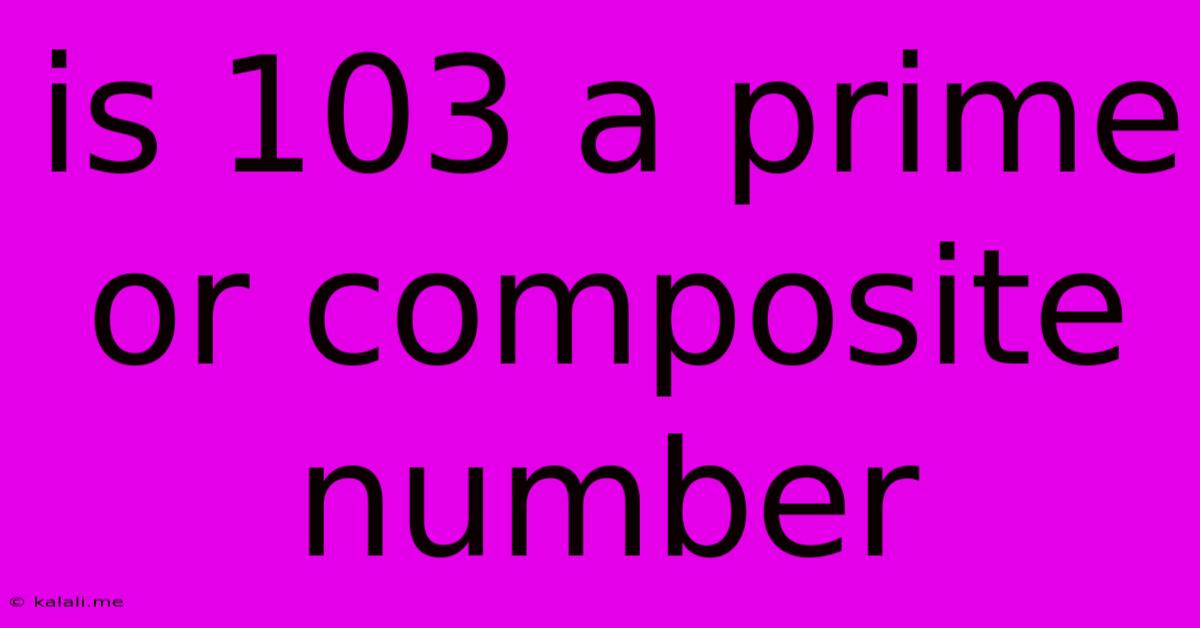Is 103 A Prime Or Composite Number
Kalali
Jun 14, 2025 · 2 min read

Table of Contents
Is 103 a Prime or Composite Number? A Comprehensive Explanation
Is 103 a prime number or a composite number? This seemingly simple question delves into the fundamental concepts of number theory. Understanding the difference between prime and composite numbers is crucial in various mathematical fields. This article will definitively answer the question about 103 and provide a clear explanation of prime and composite numbers for those who need a refresher.
What are Prime and Composite Numbers?
Before we determine the nature of 103, let's define our terms. A prime number is a whole number greater than 1 that has only two divisors: 1 and itself. This means it's not divisible by any other whole number without leaving a remainder. Examples include 2, 3, 5, 7, and 11.
A composite number, on the other hand, is a whole number greater than 1 that has more than two divisors. In other words, it's divisible by numbers other than 1 and itself. Examples include 4 (divisible by 1, 2, and 4), 6 (divisible by 1, 2, 3, and 6), and 9 (divisible by 1, 3, and 9). The number 1 is neither prime nor composite.
Determining if 103 is Prime or Composite
To determine if 103 is prime or composite, we need to check if it's divisible by any whole number other than 1 and itself. We can start by checking for divisibility by small prime numbers.
- Divisibility by 2: 103 is not divisible by 2 because it's an odd number.
- Divisibility by 3: The sum of the digits of 103 (1 + 0 + 3 = 4) is not divisible by 3, so 103 is not divisible by 3.
- Divisibility by 5: 103 does not end in 0 or 5, so it's not divisible by 5.
- Divisibility by 7: 103 divided by 7 is approximately 14.7, leaving a remainder.
- Divisibility by 11: 103 divided by 11 is approximately 9.36, leaving a remainder.
We can continue this process, but there's a more efficient method. We only need to check for divisibility by prime numbers up to the square root of 103. The square root of 103 is approximately 10.15. Since we've already checked prime numbers up to 7 (which is less than 10.15), and found no divisors, we can conclude that 103 is not divisible by any whole number other than 1 and itself.
Conclusion: 103 is a Prime Number
Therefore, based on our analysis, 103 is a prime number. It fulfills the definition of a prime number: a whole number greater than 1 that is only divisible by 1 and itself. No other whole number divides 103 without leaving a remainder. Understanding prime numbers is fundamental to many areas of mathematics, including cryptography and number theory. This example of 103 provides a clear demonstration of how to determine the primality of a number.
Latest Posts
Latest Posts
-
Least Common Multiple Of 4 8 And 12
Jun 15, 2025
-
Difference Between A Square And Rhombus
Jun 15, 2025
-
Unit Weight Of Water In Kg M3
Jun 15, 2025
-
How To Balance Chemical Equations Calculator
Jun 15, 2025
-
Which Of The Following Describes Transpiration
Jun 15, 2025
Related Post
Thank you for visiting our website which covers about Is 103 A Prime Or Composite Number . We hope the information provided has been useful to you. Feel free to contact us if you have any questions or need further assistance. See you next time and don't miss to bookmark.